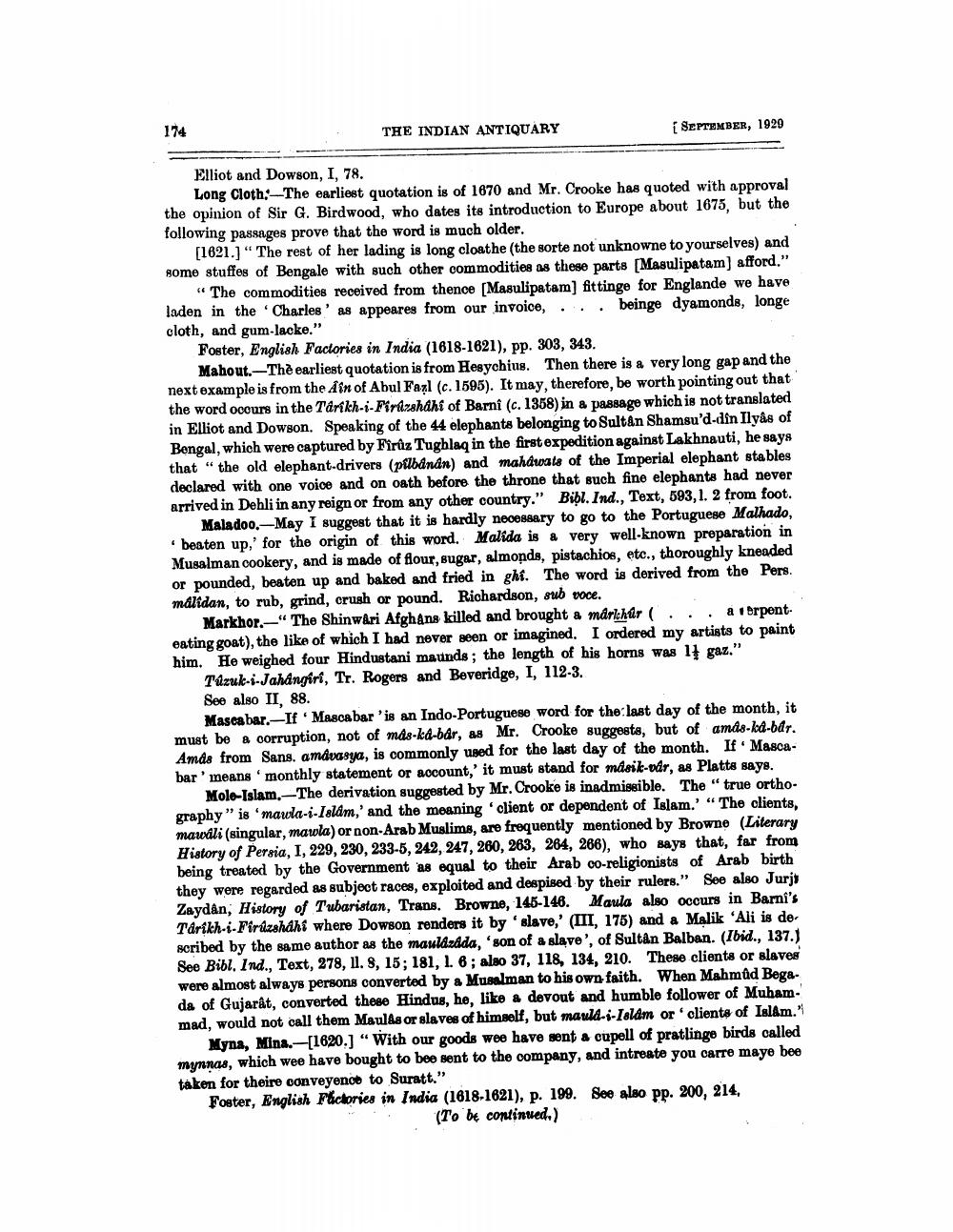________________
174
THE INDIAN ANTIQUARY
[ SEPTEMBER, 1929
Elliot and Dowson, I, 78.
Long Cloth:-The earliest quotation is of 1670 and Mr. Crooke has quoted with approval the opinion of Sir G. Birdwood, who dates its introduction to Europe about 1675, but the following passages prove that the word is much older.
[1621.]" The rest of her lading is long cloathe (the sorte not unknowne to yourselves) and some stuffes of Bengale with such other commodities as these parts [Masulipatam] afford."
"The commodities received from thence [Masulipatam] fittinge for Englande we have laden in the Charles' as appeares from our invoice, ... beinge dyamonds, longe cloth, and gum-lacke."
Foster, English Factories in India (1618-1621), pp. 303, 343.
Mahout. The earliest quotation is from Hesychius. Then there is a very long gap and the next example is from the Ain of Abul Fazl (c. 1595). It may, therefore, be worth pointing out that the word occurs in the Tarikh-i-Firazshahi of Barni (c. 1358) in a passage which is not translated in Elliot and Dowson. Speaking of the 44 elephants belonging to Sultan Shamsu'd-dîn Ilyâs of Bengal, which were captured by Firûz Tughlaq in the first expedition against Lakhnauti, he says that "the old elephant-drivers (pilbânân) and mahdwats of the Imperial elephant stables declared with one voice and on oath before the throne that such fine elephants had never arrived in Dehli in any reign or from any other country." Bibl. Ind., Text, 593, 1. 2 from foot.
Maladoo. May I suggest that it is hardly necessary to go to the Portuguese Malhado, beaten up,' for the origin of this word. Malida is a very well-known preparation in Musalman cookery, and is made of flour, sugar, almonds, pistachios, etc., thoroughly kneaded or pounded, beaten up and baked and fried in ght. The word is derived from the Pers. málidan, to rub, grind, crush or pound. Richardson, sub voce.
Markhor." The Shinwari Afghans killed and brought a márkhur (
a erpent. eating goat), the like of which I had never seen or imagined. I ordered my artists to paint him. He weighed four Hindustani maunds; the length of his horns was 1 gaz."
Tazuk-i-Jahangiri, Tr. Rogers and Beveridge, I, 112-3.
See also II, 88.
4
Mascabar. If Mascabar 'is an Indo-Portuguese word for the last day of the month, it must be a corruption, not of más-ka-bár, as Mr. Crooke suggests, but of amás-kâ-bar. Amás from Sans. amavasya, is commonly used for the last day of the month. If Mascabar' means monthly statement or account,' it must stand for másik-vár, as Platts says.
Mole-Islam. The derivation suggested by Mr. Crooke is inadmissible. The "true orthography" is 'maula-i-Islám,' and the meaning 'client or dependent of Islam.' "The clients, mawali (singular, mawla) or non-Arab Muslims, are frequently mentioned by Browne (Literary History of Persia, I, 229, 230, 233-5, 242, 247, 260, 263, 264, 266), who says that, far from being treated by the Government as equal to their Arab co-religionists of Arab birth they were regarded as subject races, exploited and despised by their rulers." See also Jurj Zaydân, History of Tubaristan, Trans. Browne, 145-146. Maula also occurs in Barni's Tarikh-i-Firúzshahi where Dowson renders it by 'slave,' (III, 175) and a Malik 'Ali is de scribed by the same author as the maulâzáda, 'son of a slave', of Sultan Balban. (Ibid., 137.) See Bibl. Ind., Text, 278, 11. 8, 15; 181, 1. 6; also 37, 118, 134, 210. These clients or slaves were almost always persons converted by a Musalman to his own faith. When Mahmûd Begada of Gujarat, converted these Hindus, he, like a devout and humble follower of Muhammad, would not call them Maulas or slaves of himself, but maula-i-Islam or clients of Islam."
Myna, Mina. [1620.] "With our goods wee have sent a cupell of pratlinge birds called mynnas, which wee have bought to bee sent to the company, and intreate you carre maye bee taken for theire conveyence to Suratt."
Foster, English Factories in India (1618-1621), p. 199. See also pp. 200, 214,
(To be continued.)




